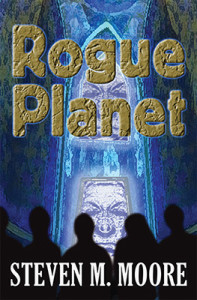“Tale of Two Planets”?
This article is another attempt to say something intelligent about book titles. Authors often can be boringly banal and copycats with their titles: “Gone…” something or the other, “Fifty Shades…” of something, or too long a trip through the alphabet—“A is for…,” “B is for…”—all boring, boring, boring, if only by showing their lack of creativity (often on the part of a publisher and not the author, I’ll admit). The standard rule that’s used is “short and to the point” when it should be “make it more interesting than what’s on a cereal box, stupid.”
I’m guilty of creating bad titles too, but I think I’ve had a few good ones. While covers and titles are just window dressing for what’s in a novel, no matter what publishers, reviewers, authors, or readers think, I suppose bad ones can hurt sales figures. (Mine are so low, it doesn’t matter.) A muscular bloke naked from the waist up with one arm around some sexy gal’s waist on a cover, along with “Love in…” or “Romance at…” in the title, could motivate serious readers perusing B&N’s shelves or online pages for their next read to flee to other authors, publishers, and booksellers. (I’ve done exactly that for years. I now think most booksellers have no idea about how to categorize a book.)
Generally speaking, I’ve been lucky with my covers, learning early in my writing career (officially starting somewhere after 9/11) that I needed professional help from a cover artist for them. I choose the titles, though, and often go through various ones from the first working title to the one finally used on the published book. My best is still The Midas Bomb that sums up the plot in only three words; the worst might be Come Dance a Cumbia…with Stars in Your Hand!, which only refers to the last scene of the novel. (I still like it, though, because it continues the theme started with Sing a Zamba Galactica.)
Some titles that I reject during the course of writing the novel are quite acceptable. Consider my novel Rogue Planet. At the time of its publication, or maybe a bit earlier, politicians were blathering about “rogue states,” meaning countries like Iran, Iraq, and Syria that didn’t follow the West’s rules of accepted civilized behavior (they still don’t, of course). That idea acceptably described the novel’s plot, was concise, and extrapolated how theocracies like Iran might even occur among the stars. (That novel might be considered the continuation and extension of “The Chaos Chronicles” trilogy; if that trilogy is my “Foundation Trilogy,” then its novels, Rogue Planet, and Mind Games are part of my “Extended Foundation Series.” Sorry, A.B.) The final published title doesn’t bring to mind anything like Game of Thrones, though, which the novel might do for some readers—they would be right, but it’s hard sci-fi, not fantasy.
One title I thought of before Rogue Planet was Tale of Two Planets. Some readers might appreciate the reference to Dickens’s Tale of Two Cities, his only novel I really liked and admired. Two planets outside the ITUIP (“Interstellar Trade Union of Independent Planets”) are involved, and the two related tribes that colonized them. What follows from that? You’ll have to read the book.
The point is that A Tale of Two Planets wasn’t a bad title; something with Thrones might have been okay; but I settled on Rogue Planet. Combined with Sara Carrick’s excellent cover (both ebook and paperback versions are available), the novel can be read as a stand-alone (despite the connection to the “Chaos Chronicles Trilogy”), and Rogue Planet is one of my shortest titles that does its job, (I do follow the “short is better” mantra: There are two one-word titles, counting Intolerance and A. B. Carolan’s Origins but not one with The; and ten two-word titles, counting The Collector.)
All of this is subsumed under one rule: Damn the publishers, etc.; choose the title that works for you!
***
 Comments are always welcome. (Please follow the rules found on the “Join the Conversation” web page.)
Comments are always welcome. (Please follow the rules found on the “Join the Conversation” web page.)
Rogue Planet. A prince leads his people to overthrow an evil theocracy and its high priest. Game of Thrones-like battle scenes, romance, and secret alliances await the reader, but it’s all hard sci-fi adventure, not fantasy, set in the same far-out universe of the “Chaos Chronicles Trilogy” in ITUIP’s near-Earth space (ITUIP = “Interstellar Trade Union of Independent Planets”). Available in both ebook and paperback format anywhere quality sci-fi books are sold.
Around the world and to the stars! In libris libertas!
